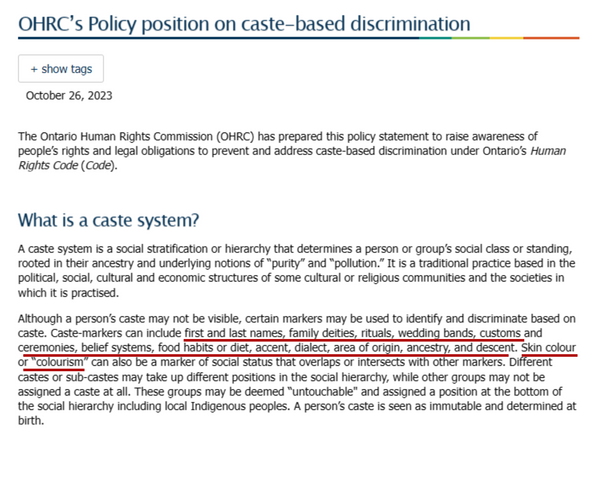TORONTO, CA: In a partial win for Canadian Hindu groups, the Ontario Human Rights Commission (OHRC) recognized that current legislation and protections already address issues related to caste-based discrimination. However, the OHRC’s policy position echoes data that is generally touted by anti-Hindu organizations and activists and can lead to serious discrimination and profiling of Canadian Hindus and people of Indian origin.
According to its recently released policy position, the existing grounds outlined in Ontario's Human Rights Code provides the necessary protections to address potential forms of discrimination based on an individual's caste or descent - a position long advocated by the Coalition of Hindus of North America (CoHNA) and recently validated in the veto of SB403 in the US state of California. The policy position explicitly acknowledges that "caste is not a prescribed Code ground," emphasizing that only the legislature can "recognize a new ground." OHRC also acknowledged that claims of caste-based discrimination are protected under existing grounds, such as "ancestry."
Reacting to the policy statement, Rishabh Sarswat, President of CoHNA Canada said, “we have consistently maintained that caste-based discrimination, if it exists at all, is already covered by existing laws. This should persuade City Councils and School Boards, which often get swayed by emotional appeals not grounded in data, to refrain from attempting to create new grounds for discrimination since OHRC clearly states it is beyond their scope.”
The policy position came after Canada’s biggest school board (TDSB) passed a "caste oppression" motion in March and then amended it after pushback from the Hindu community and its allies. The amendment removed the provision where a biased committee would have developed the curriculum, ultimately referring the motion to the OHRC for study.
Furthermore, OHRC addressed the exceptions of Ontario’s Human Rights Code which allows religious groups and other organizations to limit membership, participation, and, in some cases, employment. This is important for Hindu temples, which unlike other faiths, do not follow uniform sectarian rules. This distinction means that each Hindu temple may establish practices and roles according to the unique needs of their traditions and deities.
“We welcome this clarification”, said Nikunj Trivedi, President of CoHNA, affirming that “institutions like temples have the right to choose whom they appoint as office bearers, priests, and board members, without interference from a governmental body or without this practice being deemed discriminatory.”
Mixed messages and lack of Community input
Despite this recognition, OHRC unfortunately defined the caste system and "caste markers" with a laundry list of items including “first and last names, family deities, rituals, wedding bands, customs and ceremonies, belief systems, food habits or diet, accent, dialect, area of origin, ancestry, and descent.” In this, the commission failed to conduct a proper investigation, as none of these so-called markers for caste have been found to hold merit, according to a recent survey by CoHNA.
It must be noted that much of the language and markers used by OHRC, echo the position and even verbiage propagated by anti-Hindu organizations like Equality Labs and the South Asian Dalit Adivasi Network (SADAN), who have consistently pushed the myth that skin color, dietary choices and marrying within a community could be markers for caste discrimination. For reference see the verbiage from OHRC and its overlap with Equality Lab’s “guide to identifying caste” from 2018.
OHRC’s stance on this matter raises serious concerns about potential profiling of Hindus in Canada, leading to stigmatization of Hindus, causing trauma and bullying of Hindu students and people of Indian origin. Jay Mehta, Board Member of CoHNA Canada aptly questions: "Is a person with a last name Iyer who eats meat, upper caste for their name or Dalit for their diet according to OHRC? Or both? Is she/he expected to marry a Dalit to "prove" his castelessness? How much more absurd can this get?"
These guidelines are another way to profile Hindu Canadians, based on arbitrary and often birth-based attributes like last names, family backgrounds, skin tones, and vegetarian diets. This insensitivity is particularly traumatic given the rash of attacks the community has already been facing repeated attacks on its temples and festivals.
OHRC did not respond to CoHNA’s emails or extend an invitation to practicing Hindus to provide insight on this matter. Instead, the commission has relied on characterizations made by organizations with a history of repeatedly engaging in Hinduphobic rhetoric and promoting biases against Hindus. CoHNA Canada calls for a more equitable and informed approach to this important issue and condemns attempts to violate the civil rights of Hindus in Canada.



